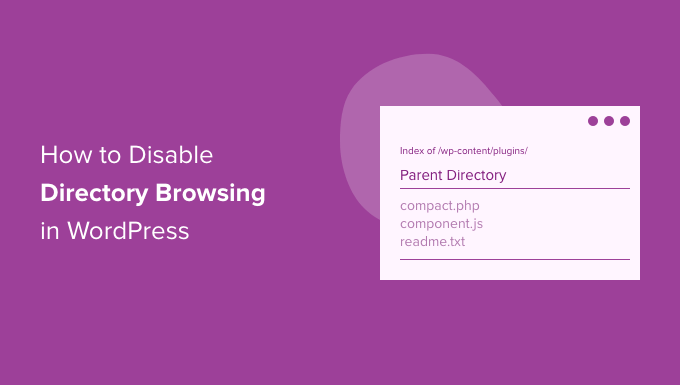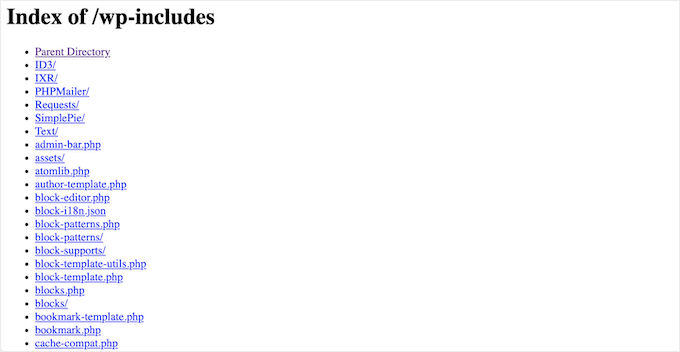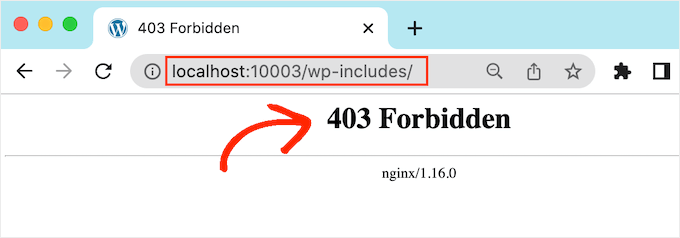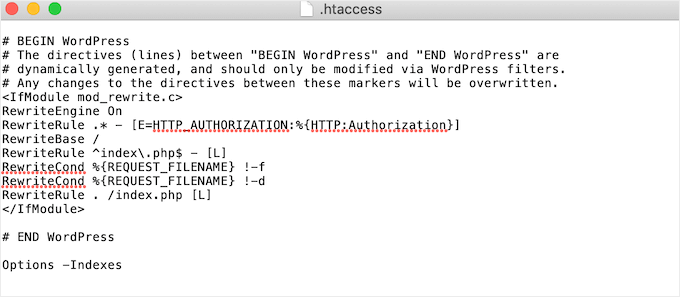Wir haben viele Websites gesehen, die das Durchsuchen von Verzeichnissen nicht deaktiviert haben. Leider kann dieser winzige Fehler dazu führen, dass Hacker auf sensible Informationen zugreifen und eine Website beschädigen.
Das Durchsuchen von Verzeichnissen ermöglicht es anderen, die Dateien und Ordner Ihrer Website einzusehen. Hacker können diese Informationen dann nutzen, um Schwachstellen in Plugins, Themes oder Ihrem Hosts Server zu finden.
Mit diesem einfachen Schritt können Sie die Sicherheit Ihrer Website erheblich verbessern. Es ist eine schnelle Lösung, die jeder Website-Besitzer kennen sollte.
In dieser Anleitung zeigen wir Ihnen, wie Sie das Durchsuchen von Verzeichnissen in WordPress deaktivieren können. So können Sie Ihre Website schützen und Ihre Daten sicher aufbewahren.

Was bewirkt das Deaktivieren des Browsing von Verzeichnissen in WordPress?
Wenn ein Besucher auf eine Website zugreift, verarbeitet der Webserver seine Anfrage. In der Regel liefert der Server eine Indexdatei, z. B. index.html, an den Browser des Besuchers.
Wenn eine Indexdatei fehlt, zeigt der Server möglicherweise eine Liste aller Dateien und Ordner in diesem Verzeichnis an. Dieses Verhalten, das als Verzeichnis-Browsing bekannt ist, ist auf Hosts Servern normalerweise standardmäßig aktiviert.
Wir haben aus erster Hand erfahren, wie das Durchsuchen von Verzeichnissen sensible Informationen über die Struktur einer Website offenlegen kann. Diese Informationen können verwendet werden, um Schwachstellen in Plugins, Themes oder sogar Hosts zu identifizieren.
Besucher könnten beim Durchsuchen von Verzeichnissen auf eine einfache Liste von Dateien und Ordnern stoßen, anstatt eine Webseite zu sehen. Dieser unbeabsichtigte Zugriff kann zu Sicherheitsrisiken führen, wenn er nicht behoben wird.

Hacker nutzen häufig das Durchsuchen von Verzeichnissen, um die Dateien einer Website, einschließlich Themes und Plugins, anzuzeigen. Wenn eine dieser Dateien bekannte Sicherheitslücken aufweist, können Angreifer diese Informationen nutzen, um die Website zu kompromittieren.
In vielen Fällen können beim Durchsuchen von Verzeichnissen auch private oder kostenpflichtige Inhalte wie Downloads von eBooks oder Online-Kursen aufgedeckt werden. Dies kann zu unbefugtem Kopieren und Umsatzeinbußen führen.
Das Deaktivieren des Durchsuchens von Verzeichnissen ist eine einfache, aber wirksame Methode, um diese Risiken zu vermeiden. Es ist einer der ersten Schritte, die wir zur Sicherung einer WordPress Website empfehlen.
So prüfen Sie, ob das Browsen in Verzeichnissen in WordPress aktiviert ist
Eine einfache Möglichkeit zu überprüfen, ob das Durchsuchen von Verzeichnissen auf Ihrer WordPress-Website aktiviert ist, ist der direkte Besuch des Ordners /wp-includes/.
Geben Sie zum Beispiel eine URL wie diese ein: https://example.com/wp-includes/ in Ihren Browser.
Stellen Sie sicher, dass Sie example.com durch den Domainnamen Ihrer tatsächlichen Website ersetzen. Dieser einfache Test funktioniert bei den meisten WordPress-Installationen.
Wenn Sie eine 403 Forbidden-Meldung oder einen ähnlichen Fehler sehen, ist das Browsen in Verzeichnissen bereits deaktiviert. Das ist ein gutes Zeichen, denn es bedeutet, dass Ihre Website sicherer ist.

Wenn stattdessen eine Liste von Dateien und Ordnern angezeigt wird, ist das Durchsuchen von Verzeichnissen aktiviert.
Dies macht Websites anfällig für bösartige Angriffe.

Unserer Erfahrung nach werden durch das Aktivieren des Durchsuchens von Verzeichnissen sensible Informationen preisgegeben und Sicherheitsrisiken erhöht. Aus diesem Grund ist es am besten, das Durchsuchen von Verzeichnissen in WordPress zu deaktivieren, damit Ihre Website sicher bleibt.
Deaktivieren des Browsens in Verzeichnissen in WordPress
Um das Auflisten von Verzeichnissen zu deaktivieren, müssen Sie einen Code in die .htaccess-Datei Ihrer Website einfügen.
Für den Zugriff auf die Datei benötigen Sie einen FTP-Client, oder Sie können die Dateimanager-App in Ihrem WordPress-Hosting-Control-Panel verwenden.
Wenn Sie FTP zum ersten Mal verwenden, lesen Sie bitte unsere vollständige Anleitung, wie Sie sich mit Ihrer Website per FTP verbinden.
Nachdem Sie sich mit Ihrer Website verbunden haben, öffnen Sie einfach den öffentlichen Ordner Ihrer Website und suchen Sie die .htaccess-Datei. Sie können die .htaccess-Datei dann bearbeiten, indem Sie sie auf Ihren Desktop herunterladen und dann in einem Texteditor wie Notepad öffnen.
Fügen Sie ganz unten in der Datei einfach den folgenden Code ein:
1 | Options -Indexes |
Sie wird in etwa so aussehen:

Wenn Sie fertig sind, speichern Sie Ihre .htaccess-Datei und laden Sie sie mit einem FTP-Client zurück auf Ihren Server.
Das war’s. Wenn Sie nun dieselbe URL http://example.com/wp-includes/ besuchen, erhalten Sie eine 403 Forbidden oder eine ähnliche Meldung.

Expertentipp: Wenn Sie vermuten, dass Ihre WordPress-Website gehackt wurde, lesen Sie unseren Leitfaden zur Behebung einer gehackten WordPress-Website. Alternativ können Sie unseren professionellen Dienst zur Reparatur gehackter WordPress-Websites in Anspruch nehmen und professionelle WordPress-Sicherheitsexperten damit beauftragen, Ihre Website sofort zu säubern.
Weitere Lektüre:
Möchten Sie Ihre WordPress-Website sicher und fehlerfrei halten? Dann könnten die folgenden Artikel für Sie nützlich sein:
- Anleitung für Anfänger zur Datei- und Verzeichnisstruktur von WordPress
- Die häufigsten WordPress-Fehler und ihre Behebung
- Fehler bei der Berechtigung für Dateien und Ordner in WordPress beheben
- Wie Sie Ihr WordPress Admin (wp-admin) Verzeichnis mit einem Passwort schützen
Wir hoffen, dass dieser Artikel Ihnen geholfen hat zu erfahren, wie Sie das Durchsuchen von Verzeichnissen in WordPress deaktivieren können. Vielleicht interessieren Sie sich auch für unseren ultimativen WordPress-Sicherheitsleitfaden oder unsere Expertenauswahl der besten WordPress-Sicherheits-Plugins.
Wenn Ihnen dieser Artikel gefallen hat, dann abonnieren Sie bitte unseren YouTube-Kanal für WordPress-Videotutorials. Sie können uns auch auf Twitter und Facebook finden.





Jiří Vaněk
Thanks for the advice. On directory browsing, or that I have it enabled, the AIO SEO plugin keeps warning me. I have currently solved the problem by making the folders have an index file that is empty. Is it possible to take this as one of the possible solutions?
WPBeginner Support
You can try that method but we would still recommend the htaccess method from our guide.
Admin
Jiří Vaněk
Thanks for the advice, I finally used the Options -Indexes method now and AIO SEO already reports the problem as solved. Thanks again.
Ka Khaliq
After editing the htaccess file as per the provided guidelines, I do see 403 Forbidden message for /wp-includes/. But I’m unable to see edit any post. Upon editing a post, I see the same 403 Forbidden message. How to solve this?
WPBeginner Support
There may be an issue with your file permissions, we would recommend taking a look at our guide below for fixing your permissions:
https://www.wpbeginner.com/wp-tutorials/how-to-fix-the-403-forbidden-error-in-wordpress/
Admin
Ka Khaliq
The issue resolved after clearing the web history/cache.
Thanks for your time.
Dina D
Thank you so much! Clear, concise, and easy to follow. Thank you so much!
WPBeginner Support
You’re welcome!
Admin
Rabee Khan
Thank You… precise and easy to understand!
WPBeginner Support
Glad our guide was helpful!
Admin
Kimmy
Thanks for the two-word solution! Lol. Worked perfectly!
WPBeginner Support
Glad we could help!
Admin
Seashell
I was shocked to see the folders accessible right in the browser.
Thanks for your solution!
WPBeginner Support
Glad we could help!
Admin
Deepak Kumar
Its work like charm. Article on wpbeginners like ready to go solution. Keep it up.
Ayo
How do I now solve the 404 error that comes after?
Pradip Singh
I am in love with this website. Every day I am surprised when I read a new article from this website. Thankfully I read this article today and immediately I implemented the advice.
WPBeginner Support
Glad you found our content helpful
Admin
Sourabh
Will it block CDNs from accessing my website for static content?
WPBeginner Support
No, it will not.
Admin
sami
Does this method affect google crawling .. is it SEO friendly?
WPBeginner Support
It should not affect search engines crawling your site.
Admin
Meera Shaikh
Thanks its Done
WPBeginner Support
You’re welcome
Admin
Pradeep
Thanks my friend, I just try this and it’s work.
You are the genius.
WPBeginner Support
Glad our guide was helpful
Admin
mousam
Thank you. I applied and it worked.
You guys are the best source for learning wordpress.
WPBeginner Support
You’re welcome, glad our guide was helpful
Admin
Kevine
Thank you very much for this. It solved my problem.
Thanks again.
WPBeginner Support
You’re welcome, glad our guide was helpful
Admin
malika
Thank you for sharing information!
WPBeginner Support
You’re welcome
Admin
Jonthan
So is it ok to have this code on .htaccess file even when an index.php file is present in the root folder.
Kindly respond.
WPBeginner Support
Yes
Admin
Teresa Cuervo
Do you need Filezila to do this or can you go to the FTP via Cpanel and do this?
Thank you
WPBeginner Support
You can use either, not all hosts have a file manager is why we show Filezilla
Admin
michael
Hello
does this action affect pages indexing on search engines?
and does it make some problems for indexed pages of my WordPress website?
Thanks
WPBeginner Support
No, it would not affect that negatively.
Admin
Rhen Castrodes
Thank you. it works
WPBeginner Support
Glad our recommendation was able to help you
Admin
John
Thank you! It works even now in 2020.
WPBeginner Support
You’re welcome
Admin
Shams
Amazing post,
Just have simple question, I added this code and it’s working, the question is Google indexes those page e.g sitecom/wp-contents/2019/2, will Google remove those pages automatically now as these are 404. Or I should remove it in Search Console?
Thanks
WPBeginner Support
This code should not make your direct links to images and files turn into 404s
Admin
Bill
Hello!
I recently applied this rule
and at the same day the front page of my blog
got vanished from google index.
Do you see any connection?
WPBeginner Support
Adding this to your htaccess should not affect your indexing, there are multiple reasons and you would want to check your Google Search Console for what it says about your home page.
Admin
Ionel G
Thanks for all the tips that you provide!
I am still wondering how can you hide the wp-content & wp-include folder from sources? I hate it when someone goes right click and source it can see all of my plugins :). Do you have any script for this?
Thank you in advance!
WPBeginner Support
We do not have a recommended method for that at the moment, the most common reason you can’t see those folders in dev tools is a site’s cache.
Admin
Mayur
Could you please tell me How can i disable WordPress in sub folder like my WordPress install on [www.mydomain.com] and i want to disable wordpress in [www.mydomain.com/customscript]
WPBeginner Support
You may want to first take a look at creating a custom page template: https://www.wpbeginner.com/wp-themes/how-to-create-a-custom-page-in-wordpress/
Otherwise, you would need to create a folder with that name and inside that folder add an index.html file for a nonWordPress page to appear.
Admin
Rafael
Thank you. Worked perfectly for all browsers.
Dipankar
but wp-content is showing . how to remove it as well.
Deatram
I disabled directory browsing, but still someone can see my directory when they use developer tools in chrome browser. How do I disable in that as well?
Faeze
I added the line that you said in .htaccess but it showes my directories yet .
What should I do now??
Nathan
When I click “Save Changes” on the Permalink Settings page the .htaccess file is updated, erasing the “Options -Indexes” code that I inputted. The code works fine, but I am concerned I will unknowingly delete it while performing some other task. Are there any other dashboard settings changes that I should know about that may affect the .htaccess file and erase the code? Thanks
Tôi Sống
Awesome, it work very good!
Baggio
Huge fan of wpbeginner, Optin Monster – I got so many useful tips and tricks on WP – and I have to say, the site design is just brilliant. And of course, the content here is epicly useful.
Thanks guys!
daniel
Hey! It doesnt seem to work. if i pull an image to another page its opened with a link of: example.com/wp-content/uploads/…
Any idea? thanks!
WPBeginner Support
Hey Daniel,
Your images and files inside directories can still be directly accessed. However, server will not let someone directly browse a directory and see its contents.
Admin
Axel Jebens
I would appreciate if you could iterate on this. I had a hard time when trying to get a solution for this issue. There are some ideas based on a htaccess redirecting to a php file that first checks if the user is logged on. Is there any plugin which provides such a function?
Ünal Hoca
Thank you
Khalid Mahmud
Thank you. It’s working…….
Kim
Sorry to late ask. I want to know, are these techniques safe to use regarding SEO score ? Hope you answer !
WPBeginner Support
Yes, they are.
Admin
Kimmy
Still works pretty well. Awesome, simple, and working. Thanks!
Charles
I have been writing this same code for weeks now but my directory remains visible to users. Pls what am doing wrong? Or could it be that my site is still loading from cached contents? Everybody says it is working but my own experience is different. Any help will be appreciated! Thanks in anticipation of your reply.
Kimmy
What part are you having trouble on? What is your hosting provider btw?
Lily
Thank you. Worked like a charm!
Prakash
This Above Trick Is Not Working Man….
Mike
Is there a way to allow viewing a directory but just hide the Parent Directory link for a specific page? This would be a network share folder that multiple people would access, and have sub folders which would still require a parent directory listing. I just don’t want anyone going above the shared folder.
Christian Nastari
This didn’t work for me. I tried before and after #END WordPress and didn’t work. I also tried “Options All -Indexes”, but didn’t work either
hrwhisper
very helpful, thank you very much
nitai
Really great. today I just faced and thinking how can I disallow like joomla and I found the exact solution.
Rob Myrick
This was very helpful and quick – thank you
Anita in SD
Thanks so much, was dismayed to see images from my site going to a parent directory :0. This was very helpful and worked well.
Blessings – A
Heather Jacobsen
Thanks for this tutorial. It worked great for hiding my uploads from anyone just wanting to browse that directory. One question, though. Does this by chance turn off the ability of search engines to browse my website. Sorry if it seems like a dumb question. I am a newbie, after all.
Wasil Burki
I added the Options -Indexes code to the htaccess file, however now I am not able to access the site I get a 503 error. Am I doing something wrong? Need help bad!! Thanks
Ted
The problem I have is that I can see the directory of this wordpress site, so if you are using this solution then it doesn’t work… (theme wpbv4)
Rahul
Thank you so much for the tutorial!
I was very concerned when I discovered some of my theme directories could be browsed. All good now, thanks to your tutorial. I never knew .htaccess packed in so much punch.